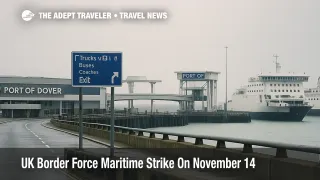UK Border Force Maritime Strike On November 14

The Public and Commercial Services (PCS) union says more than 120 Border Force Maritime officers will walk out on Friday, November 14, in a dispute over frozen allowances and terms and conditions. These officers crew the patrol boats that police UK waters, including the English Channel. Airports and passport control desks are not targeted in this action, so flight disruptions are not expected. Travelers who rely on ferries, small ports, or coastal routes should, however, plan for potential enforcement-related checks or delays and verify arrangements with their operator.
Border Force Maritime scope versus airport operations
Border Force is a law-enforcement command within the Home Office that carries out immigration and customs controls at air, sea, and rail ports, and it also patrols the British coastline. The November 14 action is specific to the maritime arm, whose officers operate cutters and coastal patrol vessels. That means the strike does not directly cover airport passport desks or the staff who process arriving passengers at terminals, so the risk to flight schedules is minimal. The practical exposure is at sea and in small harbors, where patrol presence, escorts, or inspections might be reduced or rescheduled, which can translate into slower processing for some ferry routes or private craft.
Latest developments
PCS confirmed the one-day stoppage after members voted for action in October, citing delays to allowances and dissatisfaction with proposed changes to terms and conditions. Independent reporting has repeated the date and scope, noting that maritime patrol staff, not airport staff, are the ones striking. The union frames the walkout as pressure on the Home Office to produce a fresh, acceptable offer.
What maritime patrols do, and how a strike could be felt
Cutters and coastal patrol craft are a cornerstone of the UK's "general maritime" posture, used to detect prohibited goods, deter smuggling and clandestine entry, and support joint operations with other agencies. On a normal day, these vessels conduct risk-led patrols and targeted boardings around the coast and in the Dover Strait. On a strike day, the Home Office could adjust tasking by using managers, redeploying resources, or prioritizing the highest-risk missions. For travelers, the likely manifestation is procedural rather than dramatic, for example slower-than-usual inspections on select sailings, more time spent at control points, or small schedule padding by ferry operators to maintain punctuality amid any reduced escort or inspection capacity.
Background
An October 2025 inspection of Border Force's "general maritime" work highlighted human-capital pressures and training alignment needs in the maritime environment. While independent of the pay and allowances dispute, the findings underline how specialized and safety-critical this work is, which helps explain why the union is leveraging a focused maritime stoppage rather than a broad airport-frontier strike.
Practical advice for travelers and operators
If you are booked on a ferry around Friday, November 14, build additional buffer time into your journey. Bring required identification and any vehicle documents, and keep boarding passes and reservation numbers handy in case of ad hoc checks. Check operator channels the day before travel for any minor retimings or lane-management changes at ports. Small-craft skippers should confirm reporting requirements with local harbor authorities and the UK Border Force's published guidance, and expect more variability in inspection timing. Because airports are not in scope, standard airline itineraries should proceed normally, though anyone making tight sea-to-air or air-to-sea connections should leave extra margin.
Final thoughts
The November 14 Border Force Maritime strike focuses on patrol crews at sea, not on the desks that stamp passports in airport terminals. That narrow scope is why flight disruptions are unlikely, while ferry passengers and small-port users should prepare for slower processing and keep a close eye on operator updates.
